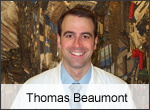
Thomas Beaumont's curiosity in medicine began when he was in grade school, but years later, when a family friend required brain surgery, his curiosity grew even stronger.
"I was taken by the idea that someone could actually 'fix something' inside of one's head," he said. After the surgery, Beaumont's mother provided him with a copy of the operative report of the surgery. "I read it in its entirety, several times over, despite the fact that I understood very little. This was the first time I considered a career as a surgeon."
He began shadowing doctors at various hospitals in addition to working as a volunteer on the bone marrow transplant unit at Karmanos Cancer Institute.
"Immediately I knew medicine was the right choice," he said. "While I was fond of the science of it, equally as appealing was the human element. The patients on the BMT unit spanned all ages and had one thing in common -- they were all very sick. Being able to be part of a patient's life at such an intimate moment was the most fulfilling experience I had ever had."
Beaumont entered the Wayne State University M.D./Ph.D. program in 2001. He completed his undergraduate degree in Biochemistry at WSU before receiving his Ph.D. from the Center for Molecular Medicine and Genetics, at the School of Medicine. His Ph.D. dissertation, titled "Defining the human epileptic transcriptome," was carried out using human brain tissue surgically removed from children with medically refractory epilepsy being treated at Children's Hospital of Michigan.
"I wouldn't do medicine without science, and I wouldn't do science without medicine. I see them as integral aspects of one another," Beaumont said. "I wanted to attend a school that offered exceptional clinical training but also had strength in research and the basic sciences. Having thoroughly enjoyed my research experiences as an undergraduate, I was also interested in pursuing a Ph.D., preferably in a combined program. Thus, Wayne State was a perfect match."
Beaumont continues to pursue studies in neuroscience for both clinical practice as well as research. He has worked in neuroscience-oriented research laboratories since the first semester of his undergraduate education and has had the opportunity to observe many neurosurgical procedures.
"From the very first time I saw the living human brain, pulsating with each heart beat, I immediately fell in love with it," he explained. "It was quite simply the most beautiful thing I had ever seen. I was taken by the notion that somewhere within its complex meshwork of cells and synapses lies the origin of who we are."
After graduation, Beaumont hopes to begin a residency in neurological surgery.
"I'm interested in an a career as a clinician-scientist, where I can combine surgical skills and scientific training to treat patients and conduct translational research on functional brain disorders such as epilepsy and behavioral disorders."